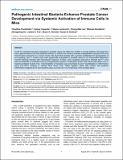Pathogenic Intestinal Bacteria Enhance Prostate Cancer Development via Systemic Activation of Immune Cells in Mice
Author(s)
Poutahidis, Theofilos; Cappelle, Kelsey; Levkovich, Tatiana; Lee, Chung-Wei; Doulberis, Michael; Ge, Zhongming; Fox, James G.; Horwitz, Bruce H.; Erdman, Susan E.; ... Show more Show less
DownloadPoutahidis-2013-Pathogenic Intestina.pdf (2.067Mb)
PUBLISHER_CC
Publisher with Creative Commons License
Creative Commons Attribution
Terms of use
Metadata
Show full item recordAbstract
A role for microbes has been suspected in prostate cancer but difficult to confirm in human patients. We show here that a gastrointestinal (GI) tract bacterial infection is sufficient to enhance prostate intraepithelial neoplasia (PIN) and microinvasive carcinoma in a mouse model. We found that animals with a genetic predilection for dysregulation of wnt signaling, Apc[superscript Min/+] mutant mice, were significantly susceptible to prostate cancer in an inflammation-dependent manner following infection with Helicobacter hepaticus. Further, early neoplasia observed in infected Apc[superscript Min/+] mice was transmissible to uninfected mice by intraperitoneal injection of mesenteric lymph node (MLN) cells alone from H. hepaticus-infected mutant mice. Transmissibility of neoplasia was preventable by prior neutralization of inflammation using anti-TNF-α antibody in infected MLN donor mice. Taken together, these data confirm that systemic inflammation triggered by GI tract bacteria plays a pivotal role in tumorigenesis of the prostate gland.
Date issued
2013-08Department
Massachusetts Institute of Technology. Department of Biological Engineering; Massachusetts Institute of Technology. Division of Comparative MedicineJournal
PLoS ONE
Publisher
Public Library of Science
Citation
Poutahidis, Theofilos, Kelsey Cappelle, Tatiana Levkovich, Chung-Wei Lee, Michael Doulberis, Zhongming Ge, James G. Fox, Bruce H. Horwitz, and Susan E. Erdman. “Pathogenic Intestinal Bacteria Enhance Prostate Cancer Development via Systemic Activation of Immune Cells in Mice.” Edited by Deyu Fang. PLoS ONE 8, no. 8 (August 26, 2013): e73933.
Version: Final published version
ISSN
1932-6203